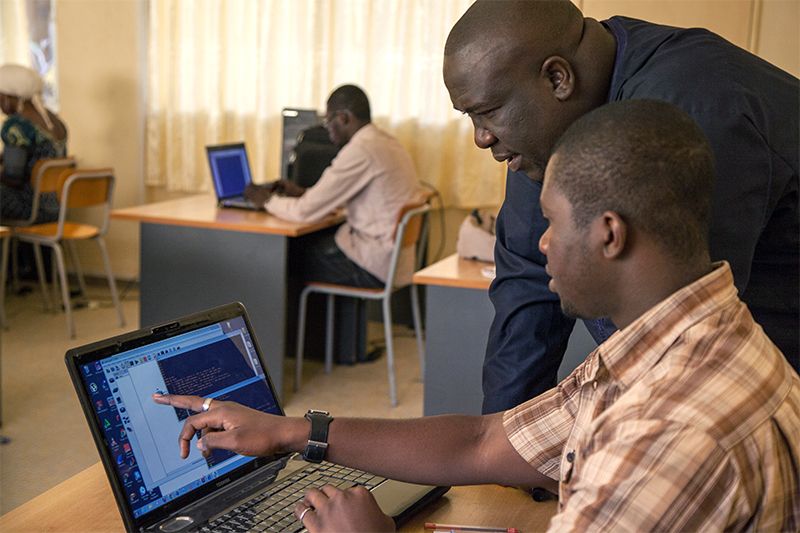In the context of industry 4.0 and the COVID-19 epidemic, digital solutions have become popular and highly applicable. Below is an analysis of the electronic logistics management information system (eLMIS) in the immunisation supply chain.
Proper logistics management information system (LMIS) in the supply chain improves health outcomes by maintaining accurate and timely information. It helps systematise the way of collecting, processing, reporting, and using health products data gathered across all levels of the health system [1]. Coming along with the global digitalization, electronic logistics management information system (eLMIS) has gradually become an inevitable trend, especially in the context of COVID-19 where the demand for accurate information and vaccines highlights the critical role of eLMIS. In the scope of immunisation supply chain area, eLMIS is an innovative solution that will not only improve vaccine delivery efficiency, but also contribute to increasing global vaccine coverage and reducing zero dose children and missed communities.
The benefits of eLMIS
The digitisation of the supply chain information systems means that countries will have end-to-end visibility for all health products from the manufacturer to patient, full integration across disease programmes, use of barcodes to register products in and out of each store, automatic alerts when there is an over or under-stock and ability to monitor temperature (for products requiring refrigeration as vaccine) at every stage. In immunisation programmes, vaccines stock out at point of vaccination is among the most common reasons for non-vaccination. eLMIS will contribute to ensuring vaccines are consistently available where they are needed and will help reduce the number of zero-dose children by enabling the right data of the right quality at the right time, in the hands of the right people in the right place, to make the right decision and take the right action[2]. Vaccine wastage undermines donor and domestic funding and eLMIS can help improve the effectiveness and efficiency of supply chains, making countries’ programmes more sustainable.
eLMIS can also help strengthen the performance of the supply chain as well as health programs. Health staff (including operators, supervisors, technicians, managers, and local health workers) with equipped knowledge and skills will have an outlook to improve work efficacy and track the progress of product flow. The availability and potency of vaccines and other health products can be secured and allocated under strict management, which avoids stock-out of vaccines and delivers vaccines to communities on demand; thus, the possibility of missing communities will be reduced. Additionally, organised eLMIS can enhance the efficiency of vaccine forecasting, the risk of wastage from medical activities, not only immunisation exercises but other clinical practices (vaccination and outdated products) also can be controllable at the maximum level. All listed advantages will exert a positive effect on filling the gap to achieve full vaccine coverage and beyond to the goal of vaccine equity.
What do we need to implement eLMIS?
The benefits of eLMIS are undisputed. However, to have a well-organised eLMIS for a health supply chain, it requires a time-consuming process and resources mobilisation and commitment. Countries must invest in their level of supply chain maturity for health and their readiness to implement eLMIS, particularly for immunisation supply chain. John Snow, Inc – a global organisation sums up several critical questions, which should be answered[3]:
- Is there any eLMIS model conducted? For which health products? Which level does the system reach (districts or health facilities)? What geographical areas can eLMIS cover?
- How long does it take to deploy or integrate an eLMIS?
- Do countries have enough financial resources for implementing and maintaining eLMIS and do they have enough commitment?
- Is there any policy to support eLMIS implementation?
Several countries with support from international agencies have been adopting eLMIS based on target software standard (TSS) such as Malawi, Pakistan, Tanzania, and Gambia. In Malawi, cStock is a mobile-based logistics management information system, using RapidSMS, with a web accessible dashboard, which assists to manage and distribute child health and family planning products to health facilities. In Tanzania and Gambia, OpenLMIS is the open-source platform used for managing public health commodities (particularly vaccines). Feedbacks from such countries indicate the accuracy in data management, supply chain visibility, and reduced stockout that the recently adopted eLMIS tools have enabled.
Vision eLMIS from international level/scale
The benefits and development potential of eLMIS are focused and recognised by donors, international agencies, and organisations. The development of the Gavi eLMIS scale-up strategy will take place with a participatory and evidence-based approach to ensure the eLMIS benefits more people and LMICs adopt policy and programme development on a long-lasting basis. The Gavi eLMIS scaling up strategy will be aligned and support the overarching Gavi 5.0 strategy and the Digital Health Information strategy that has been developed at the same time, as well as the innovation strategy.
To support countries complete eLMIS investment, USAID provides the LMIS maturity model with a 5-level hierarchy and a structure that serves a useful heuristic purpose to swiftly assess where a country sits on the maturity scale. As a global organisation, USAID has invested in eLMIS in 33 countries, specifically 27 African countries, 2 South-East Asia countries, 2 Eastern Mediterranean countries and 2 from the American region.
Conclusion
Digitalisation of the supply chain information system is a critical approach and pre-condition to overcome data visibility and integrity barriers. The digital shift will improve supply chain system performance by automating data processes and tasks, while avoiding duplication of work and inconsistencies of data. Implementing eLMIS for immunisation is a part of the digitalisation process that requires countries to have comprehensive assessment and adopt new and improved processes. The final target is to achieve full immunisation coverage and equity for all.
[1] Logistic management information system
[2] THE SUPPLY CHAIN MANAGER’S HANDBOOK A PRACTICAL GUIDE TO THE MANAGEMENT OF HEALTH COMMODITIES
[3] Why invest in eLMIS[/vc_column_text][/vc_column][/vc_row]

